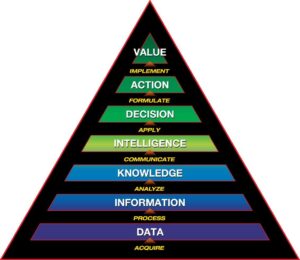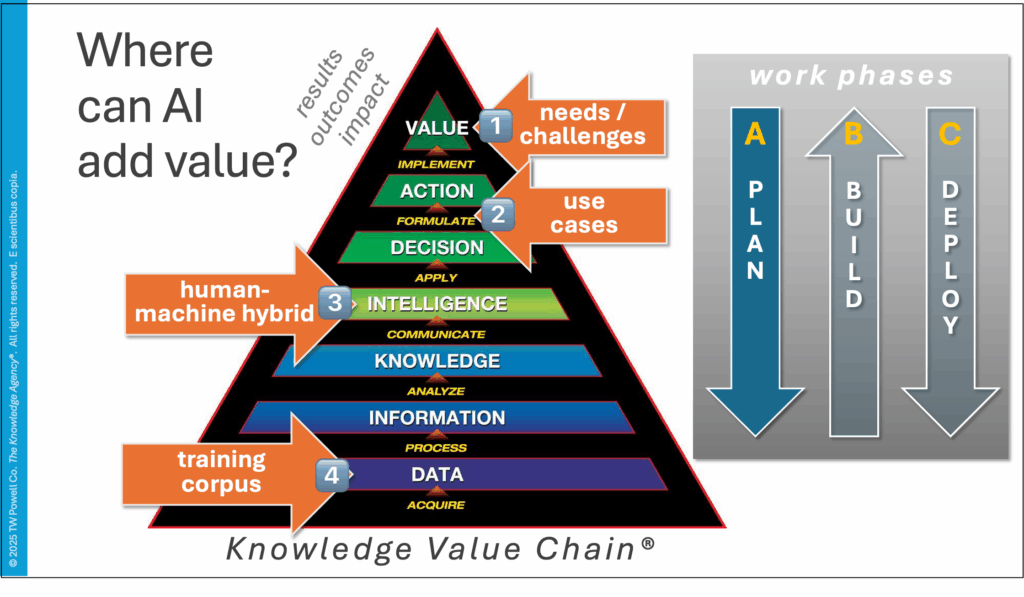Our Tools and Methods
All of our work links the value of knowledge and information to the value of the overall organization — its goals, strategies, and performance. We apply business tools and metrics to epistemic resources — data, information, knowledge, and intelligence (DIKI). We call our approach Knowledge Resources Management (KRM).
What’s the value of knowledge?
In general, the value of knowledge is determined by its agency — what we do with that knowledge. In enterprise — business, government, or nonprofit — we seek knowledge, not as an end in itself, as might be the case in an academic context.
Rather, we seek knowledge primarily as a catalyst to producing enterprise value by:
- improving performance,
- managing risk, and
- enabling a range of other outcomes-based enterprise goals.
What’s the Knowledge Value Chain®?
In working with TKA’s clients, we’ve developed tools and methods to help our clients rapidly visualize, diagnose, and improve the quality, value, and performance of their epistemic resources. The best-known of these is our KVC, shown here.
The KVC framework examines the transformations from knowledge to value in detail — enabling you to assess and amplify the value of your existing knowledge resources, as well as deploy new ones where needed.
How does the KVC help us in practice?
Quality assurance is as important for data as it is for manufacturing. As our enterprises — and our entire economy — rely increasingly on data, our trust in that data become especially critical. The KVC adapts Total Quality frameworks originally designed for manufacturing environments to enterprise epistemic resources.
The importance of this will only increase as human-machine hybrid approaches are increasingly deployed throughout the enterprise and the global economy. Much of our current work serves to ensure that the business case drives the deployment of AI and other technologies — not the other way around, as shown here:
How is the KVC different?
There are other frameworks that have Data, Information, and Knowledge (DIK) as foundations. We call these DIKx models — “x” typically being Wisdom (or something equally abstract and lofty.) In what ways is the KVC model different and (we think) more effective? To name a few:
- KVC thinking describes knowledge, not as the end point, but as an enabling force on the pathway to value
- KVC details the transformations required to move from one step to the next — and the potential challenges in each
- KVC explicitly considers the users and applications of knowledge in solving business problems
- KVC describes the economic impact of knowledge
As one client put it, “I thought [the KVC] was a really useful diagram due to [its showing] the actions needed to move through the stages and that it didn’t just stop at knowledge like a lot of the others.”
How can we use the KVC?
The KVC helps anyone—in any industry—who produces, manages, and/or uses information in helping an organization to achieve its strategic and tactical goals. We’ve applied it in a range of client situations, most often in our work with professionals in:
|
|
The KVC product line consists of books, coaching, clinics, and in-depth technical assistance provided by our worldwide licensee The Knowledge Agency®, a consultancy wholly owned by TW Powell Co., a New York corporation. Knowledge Value Chain and Knowledge Agency are registered trademarks of TW Powell Co.
How can we learn more?
Three easy steps will get you started:
- Start by watching this short intro video.
- Then buy the KVC Handbook listed on the front page.
- Even better, contact us and we’ll tell you more.

Recent Comments